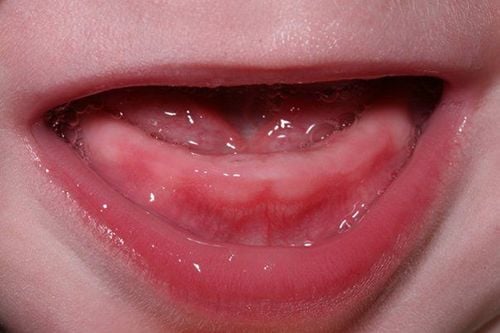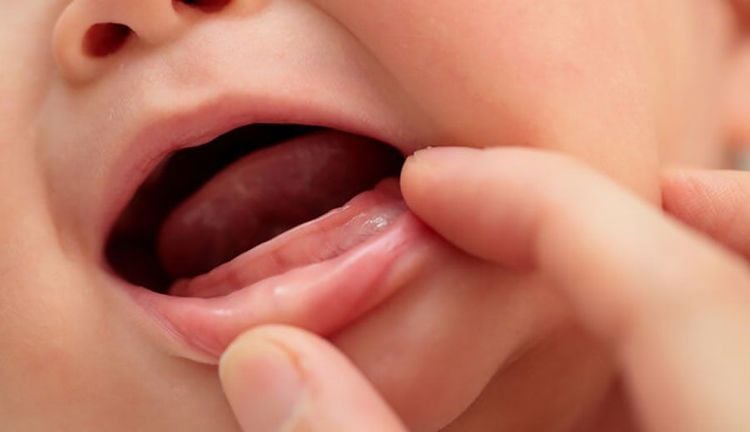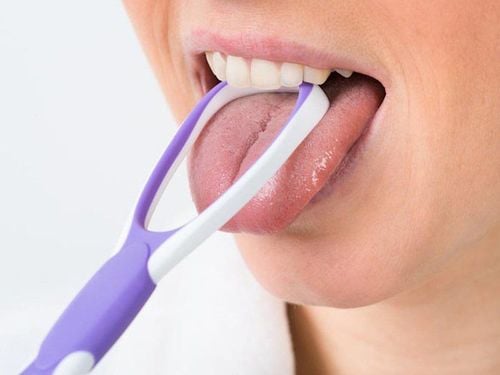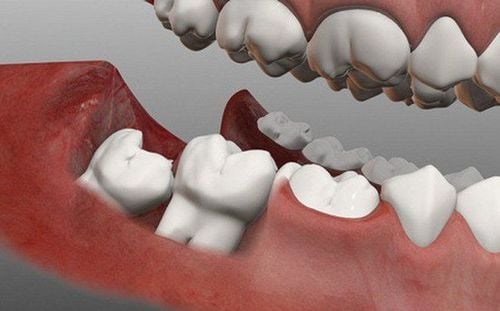This is an automatically translated article.
The article was professionally consulted by Doctor of Pediatrics - Neonatology - Vinmec Nha Trang International General Hospital.Delayed teething is a condition in which the baby teeth grow slowly. If after 12 months, the baby teeth have not started to grow, the teeth are slowly growing, parents should take the child to see a dentist for examination and timely intervention. Because if this situation is left for too long, it can lead to bad complications later on such as: tooth decay, crown inflammation, misaligned permanent teeth...
1. Teething process in young children
Babies will begin to erupt their first tooth around the age of 6 months, and are basically full by about 2 or 2 and a half years old. However, not all children have the same teething schedule. There are children whose teeth come in very early, but there are also children who are more than 1 year old and still have no signs of teething. So why do children grow teeth slowly even though they are eating well?In each child, the process of teething is completely different, some children teething early, some children teething late. The number of teeth of a child is usually equal to the number of months of age minus 4. Normally when a child is 6 months old, the first tooth will come in. Children begin to develop the lower incisors first, then the upper incisors, followed by the first primary molars, and then the canines. When the second baby molar comes in, it's also when the baby teeth have fully grown, 10 upper molars and 10 lower molars, at this time the child is about 3 years old. If a child is 13 months old and still has not had any teeth, it can be confirmed that the child has delayed teething.

In the 7th month, the incisors begin to erupt. In the 11th month, 4 central incisors have fully grown (including: 2 molars). upper and 2 lower molars) In the 15th month, 4 more lateral incisors grow (ie, 8 incisors are fully grown) In the 19th month, 4 more premolars grow. In the 23rd month, 4 more canines grow. In the 27th month, 4 more teeth grow. 5 Permanent teeth begin to erupt between the ages of 6 and 12. Wisdom teeth come in much later, around the age of 17.
Trắc nghiệm: Sự phát triển tinh thần, vận động của bé thế nào là đúng chuẩn?
Khi nào bé biết nói, biết hóng chuyện hay biết cầm cốc là "đúng chuẩn"? Điểm xem bạn biết được bao nhiêu mốc phát triển tinh thần, vận động "đúng chuẩn" của bé nhé!The following content is prepared under supervision of Thạc sĩ, Bác sĩ y khoa, Ma Văn Thấm , Nhi , Phòng khám Đa khoa Quốc tế Vinmec Dương Đông(Phú Quốc)
2. What is delayed teething?
Delayed teething is the slow growth of baby teeth in young children. If after 12 months, the baby teeth have not started to erupt, the teeth are slowly erupting.Normally, babies start teething at 6 months and by about 2 and a half years old, they will have all 20 baby teeth. Therefore, if after 12 months of age, the baby still has not had any baby teeth, your baby has delayed teething. For children who only have delayed teething but their bodies still develop normally, it is due to the child's physiology. If children have delayed teething accompanied by stunting, lack of height and weight, difficulty sleeping, night sweats, etc., the possibility that the child's teething delay may be due to the supplementary nutrition for the child. not reasonable. However, if after 12 months, the child still has not had teeth, it means that the baby has delayed teething, parents should take the child to the dentist so that the doctor can examine and intervene in time.
3. Causes of delayed teething in children
3.1. Objective causes Genetics One of the main reasons why children are slow to grow teeth is genetics. Take a look at your family history to see if anyone has had this problem. If so, then you may need to wait until your baby is teething.Due to the different time of early / late birth: Babies born prematurely, born prematurely, with low birth weight will often have delayed teething compared to babies born at full term and full weight.
Oral infections If your child has gingivitis, an infection of the oral cavity, it can lead to delayed teething. Itchy bacteria and fungi grow in the oral cavity, causing damage to the gums and gums. As a result, the baby's teeth will not be able to erupt.
Children with delayed teething due to an infection of the oral cavity have a bad odor, the child has pain, or is fussy.
Some dental diseases, infections, children's teeth, especially the damaged gums and gums, also lead to delayed teething.

Congenital: According to doctors, children with delayed teething may be due to congenital causes and not necessarily due to lack of nutrients. Babies born prematurely often have a slower rate of teeth erupting than babies born at full term.
Due to vitamin D deficiency: A lack of vitamin D will prevent the body from using calcium to build bone and teeth structure. Therefore, vitamin D deficiency may be the reason for delayed teething in children. The main source of vitamin D is sunlight. Please provide timely replenishment. Vitamin D deficiency can occur spontaneously in premature babies. The lack of Vitamin D will directly affect the absorption of Calcium.
Due to lack of calcium: When children are deficient in calcium, it will make the tooth sprouts underdeveloped, so they cannot grow out. Milk is the best source of calcium for children. In the first 6 months, babies are still breastfed, so if the mother in the process of breastfeeding, eat a diet that will lead to a lack of calcium to provide the baby. In addition, the child's body absorbing too much phosphorus can also cause the child's calcium absorption to be reduced.
Due to lack of MK7 MK7 is a type of vitamin K2, taking on the main task of bringing calcium in the blood into bones and teeth to help children grow healthy and beautiful teeth. For many children, they may already have enough calcium and Vitamin D ready, but without MK7, the effect is only about 30%.
Absorption of too much Phosphorus: Too much phosphorus prevents the body's absorption of Calcium. Therefore, children with an excess of phosphorus will have a calcium deficiency, causing the tooth germ to take a long time to emerge from the gums. Children with excess phosphorus are also accompanied by manifestations such as hardening of blood vessels, kidney failure and enlarged heart ...
Malnutrition: Children's physical development is underdeveloped, not creating enough energy to provide for activities for children. Children can also cause teeth to erupt later than children with good nutrition and good physical condition.
Children with certain medical conditions: It may be because children with Down syndrome or children with abnormal pituitary gland problems are also likely to grow teeth more slowly than usual.
4. Children with delayed teething are dangerous?
Parents should not be too worried when their children are delayed in teething because delayed teething is not dangerous for their children, and should not be compared with other children because the teething time of each child is not the same. Some children have teeth by 4 months, some children are 9-10 months later. Depending on each child, the baby teeth have finished erupting at 2 or 3 years of age with a full set of 20 teeth. If the family is still not sure, they can take the children to the doctor, take X-rays to determine if there are any unusual problems.Usually, children with calcium deficiency will have slower teething than other children, but early teething does not mean enough calcium. Many babies are born with teeth, this is a normal physiological process. If you have teeth in 3 months, then there is nothing to worry about. For children with early teething, parents need to pay more attention to the child's anorexia. Teething children may have pain, fever leading to fatigue and loss of appetite, so during this period should not be too concerned about the child's weight.

Permanent teeth are misaligned because baby teeth grow too slowly. The permanent teeth appear at the same time as the baby teeth that grow slowly, forming "double teeth", in rare cases, the permanent teeth will erupt before the baby teeth. As a result, baby teeth and permanent teeth exist in parallel, giving the baby two teeth. Periodontitis is caused by the tooth remaining below the gum surface. Tooth decay, even when the tooth is below the gum, bacteria that cause tooth decay can still grow. This condition can spread, causing children to have multiple tooth decay at the same time.
5. How to deal with delayed teething
When seeing a child teething late, the first thing parents need to do is to consider the child's health status, find out the cause of the child's delay in teething to get solutions to help the child improve this situation.Right from the stage of pregnancy and lactation, the mother should eat a variety and enough quality, should not be too abstinent. In particular, the most important is to provide adequate nutrients such as calcium, vitamins ... for the fetus to develop as comprehensively as possible.
To deal with delayed teething, mothers need:
5.1. Change in daily habits: It is necessary to add vitamin D 400UI/day for children under 1 year of age who are exclusively breastfed or formula-fed below 600ml/day to prevent vitamin D deficiency for children. 5.2. Improve nutrition for children: Ensure a balanced daily nutritional intake for children, especially milk and dairy products, animal foods, fats... Menus for children with delayed teething should ensure the elements of sugar, protein, starch, fat... Should pay attention to provide adequate protein and especially animal protein during the child's weaning process. You can add cooking oil in the bowl of flour (or porridge) for the child. Children should eat more fresh fruits or you can squeeze water for children to drink or grind the whole pulp and give it to children to use. In addition to milk as the main source of nutrition, mothers can also give their children yogurt or cheese. Children should be taught to eat according to the schedule and avoid snacking. Should increase milk 500-800ml per day. In particular, do not mix milk for children with porridge, powdered water, vegetable juice... and especially mineral water because it can reduce calcium absorption. In addition, it is advisable to let children get enough sleep and encourage them to be active, which is also a measure to stimulate children's appetite and avoid malnutrition. Delayed teething in children is not dangerous, but to avoid the risk of bad complications later, parents should bring their children to see the dentist when they are more than 12 months old and the child has not had any teeth. In addition, parents should also apply some methods to change habits and improve nutrition to support the child's teeth to develop better.
Besides, parents also need to supplement their children with essential micro-minerals such as zinc, lysine, chromium, selenium, vitamin B1, ... to fully meet the nutritional needs of children. The addition of these essential vitamins also supports digestion, enhances nutrient absorption, improves anorexia, and helps children eat well. Parents can simultaneously apply dietary supplements and functional foods derived from nature for easy absorption. The most important thing is that improving your baby's symptoms often takes a long time. Combining many types of functional foods at the same time or changing many types in a short time can make the baby's digestive system unable to adapt and completely not good. Therefore, parents must be really patient with their children and regularly visit the website vimec.com to update useful baby care information.














